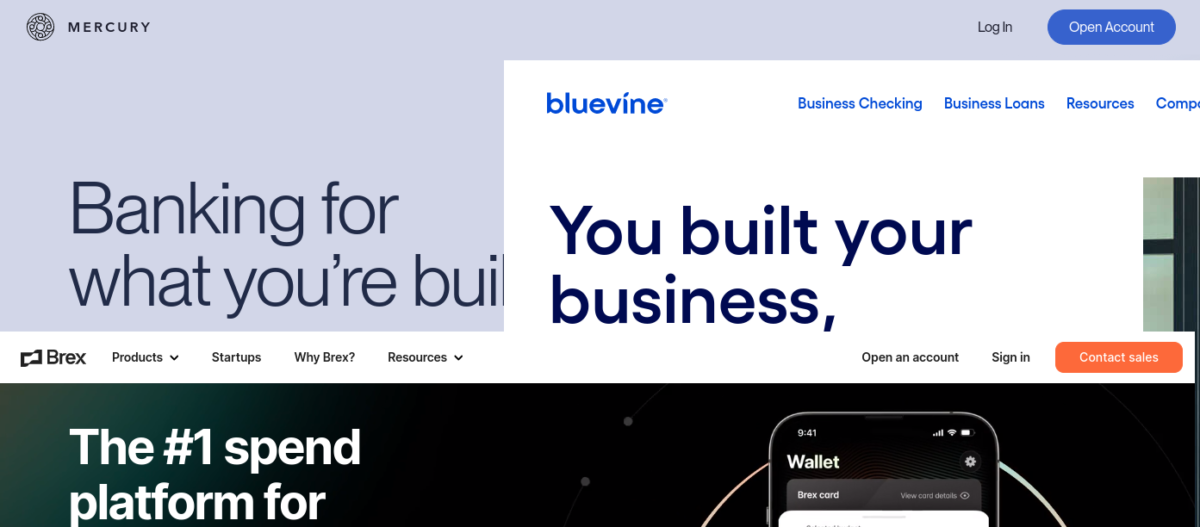
Top 3 Banking Platform Services for Entrepreneurs and Startups

- BlueVine: BlueVine is a popular online platform that provides small businesses with access to financing solutions, including lines of credit, invoice factoring, and term loans.

PROS
- Fast and easy application process: BlueVine’s application process is quick and straightforward, and most customers receive a decision within 24 hours.
- Flexible financing options: BlueVine offers a range of financing options, including lines of credit, invoice factoring, and term loans, giving small business owners the flexibility to choose the option that best suits their needs.
- Competitive rates: BlueVine’s rates are competitive with other online lenders, and there are no prepayment penalties or hidden fees.
- User-friendly platform: BlueVine’s platform is easy to navigate, and customers can access their accounts online 24/7.
- Excellent customer service: BlueVine has a knowledgeable and responsive customer support team that is available to assist customers with any questions or concerns.
Cons
- Limited eligibility: BlueVine has strict eligibility requirements, and some small business owners may not qualify for financing.
- High credit score requirement: BlueVine requires a minimum credit score of 600, which may exclude some small business owners with poor credit.
- Limited funding amounts: BlueVine’s funding amounts may be lower than what some small businesses need to grow and expand.
- Short repayment terms: BlueVine’s repayment terms are relatively short, which may make it challenging for some small businesses to repay their loans.
- Limited geographic coverage: BlueVine’s financing solutions are only available in certain states, so some small business owners may not be able to access their services.
- Brex: Brex is a financial technology company that offers corporate credit cards, cash management, and other financial services to startups and businesses.

PROS
- Fast and easy application process: Brex’s application process is quick and straightforward, and most customers receive a decision within minutes.
- Flexible credit limits: Brex offers high credit limits that can be customized to suit each business’s needs, based on factors such as revenue and spending patterns.
- No personal guarantee required: Unlike most business credit cards, Brex does not require a personal guarantee, meaning business owners are not personally liable for any debts.
- Rewards and benefits: Brex offers rewards and benefits that are tailored to the needs of startups and small businesses, such as discounts on software and services, travel rewards, and cashback on common business expenses.
- Robust expense management tools: Brex offers a suite of expense management tools, including real-time spending alerts, customizable spending categories, and easy integration with accounting software.
Cons
- Limited eligibility: Brex’s corporate credit cards are only available to startups and businesses with certain funding or revenue thresholds.
- High fees: Brex charges a number of fees, including an annual fee, foreign transaction fees, and fees for cash advances and late payments.
- Limited acceptance: Brex is not accepted everywhere that traditional credit cards are, which can be a limitation for businesses that rely on vendors who don’t accept Brex.
- Limited rewards: While Brex’s rewards are tailored to the needs of startups and small businesses, they may not be as generous or flexible as rewards offered by other credit card companies.
- Limited customer service: Brex’s customer service team is only available during business hours, which may be a limitation for businesses that need support outside of those hours.
- Mercury: Mercury is a digital banking platform that offers financial services to startups and businesses, including online checking accounts, savings accounts, and payment processing.

PROS
- Easy account opening process: Mercury’s account opening process is quick and easy, and most customers can open an account in a matter of minutes.
- No fees: Mercury does not charge any monthly maintenance fees, overdraft fees, or other hidden fees.
- High interest rates: Mercury’s savings accounts offer high interest rates compared to traditional banks.
- Payment processing: Mercury offers payment processing services that are easy to use and integrate with other business tools.
- Digital tools and integration: Mercury offers a range of digital tools and integrations, including an API that allows developers to build custom integrations with the platform.
Cons
- Limited banking services: Mercury offers a limited range of banking services compared to traditional banks, such as loans, credit cards, and other financial products.
- No physical branches: Mercury is an online-only bank, which means customers can’t visit a physical branch to conduct transactions or get in-person support.
- Limited ATM access: While Mercury does not charge ATM fees, it has a limited network of ATMs that customers can use without incurring fees.
- Limited eligibility: Mercury’s banking services are only available to startups and businesses registered in the United States.
- Limited customer service: Mercury’s customer service team is only available during business hours, which may be a limitation for businesses that need support outside of those hours.
